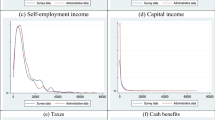Abstract
The measurement of inequality of opportunity has hitherto not been attempted in a number of countries because of data limitations. This paper proposes two alternative approaches to circumventing the missing data problems in countries where a demographic and health survey (DHS) and an ancillary household expenditure survey are available. One method relies only on the DHS, and constructs a wealth index as a measure of economic advantage. The alternative method imputes consumption from the ancillary survey into the DHS. In both cases, we compute a lower bound estimator of the share of (ex-ante) inequality of opportunity in total inequality. Parametric and non-parametric estimates are calculated for each method, and the parametric approach is shown to yield preferable lower-bound measures. In an application to the sample of ever-married women aged 30–49 in Turkey, inequality of opportunity accounts for at least 26% (31%) of overall inequality in imputed consumption (the wealth index).
Similar content being viewed by others
References
Alesina, A., La Ferrara, E.: Preferences for redistribution in the land of opportunities. J. Public Econ. 89(5–6), 897–931 (2005)
Aran, M., Demir, S., Sarica, O., Yazici, H.: Poverty and welfare changes in Turkey 2003–2006. The World Bank Turkey Office. Mimeo (2008)
Arneson, R.J.: Equality of opportunity for welfare. Philos. Stud. 56, 77–93 (1989)
Bossert, W.: Opportunity sets and individual well-being. Soc. Choice Welf. 14(1), 97–112 (1997)
Bourguignon, F., Ferreira, F.H.G., Menéndez, M.: Inequality of opportunity in Brazil. Rev. Income Wealth 53(4), 585–618 (2007)
Bourguignon, F., Ferreira, F.H.G., Walton, M.: Equity, efficiency and inequality traps: a research agenda. J. Econ. Inequal. 5(2), 235–256 (2007)
Checchi, D., Peragine, V.: Inequality of opportunity in Italy. J. Econ. Inequal. 8(4), 429–450 (2010)
Cohen, G.A.: On the currency of Egalitarian Justice. Ethics 99(4), 906–944 (1989)
Dworkin, R.: What is equality? Part 2: equality of resources what is equality? Part 2: equality of resources. Philos. Public Aff. 10(4), 283–345 (1981)
Elbers, C., Lanjouw, J.O., Lanjouw, P.: Micro-level estimation of poverty and inequality. Econometrica 71(1), 355–364 (2003)
Ferreira, F.H.G., Gignoux, J.: The measurement of inequality of opportunity: theory and an application to Latin America. Rev. Income Wealth (2011, forthcoming)
Filmer, D., Pritchett, L.H.: Estimating wealth effects without expenditure data—or tears: an application to educational enrollments in states of India. Demography 38(1), 115–132 (2001)
Filmer, D., Scott, K.: Assessing asset indices. Policy Research Working Paper Series, 4605, The World Bank (2008)
Fleurbaey, M.: Fairness, Responsibility and Welfare. Oxford University Press, Oxford (2008)
Fleurbaey, M., Peragine, V.: Ex ante versus ex post equality of opportunity. ECINEQ Working Paper 2009-141 (2009)
Foster, J., Shneyerov, A.: Path independent inequality measures. J. Econ. Theory 91(2), 199–222 (2000)
Kolenikov, S., Angeles, G.: Status measurement with discrete proxy variables: is principal component analysis a reliable answer? Rev. Income Wealth 55(1), 128–165 (2009)
Lefranc, A., Pistolesi, N., Trannoy, A.: Inequality of opportunities vs. inequality of outcomes: are western societies all alike? Rev. Income Wealth 54(4), 513–546 (2008)
Lefranc, A., Pistolesi, N., Trannoy, A.: Equality of opportunity and luck: definitions and testable conditions, with an application to income in France. J. Public Econ. 93(11–12), 1189–1207 (2009)
Marrero, G.A., Rodríguez, J.G.: Inequality of opportunity and growth. Universidad Rey Juan Carlos, Spain. Mimeo (2010)
McKenzie, D.: Measuring inequality with asset indicators. J. Popul. Econ. 18(2), 229–260 (2005)
Ooghe, E., Schokkaert, E., van de Gaer, D.: Equality of opportunity versus equality of opportunity sets. Soc. Choice Welf. 28(2), 209–230 (2007)
Peragine, V.: Ranking income distributions according to equality of opportunity. J. Econ. Inequal. 2(1), 11–30 (2004)
Persson, T., Tabellini, G.: Is inequality harmful for growth? Am. Econ. Rev. 84(3), 600–621 (1994)
Rawls, J.: A Theory of Justice. Harvard University Press, Cambridge (1971)
Roemer, J.E.: A pragmatic theory of responsibility for the egalitarian planner. Philos. Public Aff. 22, 146–166 (1993)
Roemer, J.E.: Equality of Opportunity. Harvard University Press, Cambridge (1998)
Roemer, J.E.: Equality of opportunity: a progress report. Soc. Choice Welf. 19(2), 455–471 (2002)
Roemer, J.E.: The 2006 world development report: equity and development—a review. J. Econ. Inequal. 4(2), 233–244 (2006)
Sen, A.: Equality of what? In: McMurrin, S. (ed.) Tanner Lectures on Human Values. Cambridge University Press, Cambridge (1980)
Shorrocks, A.F.: Decomposition procedures for distributional analysis: a unified framework based on the Shapley Value. University of Essex. Mimeo (1999)
Shorrocks, A.F., Foster, J.E.: Transfer sensitive inequality measures. Rev. Econ. Stud. 54(3), 485–497 (1987)
van de Gaer, D.: Equality of Opportunity and Investment in Human Capital. PhD dissertation, Catholic University of Leuven, Belgium (1993)
Author information
Authors and Affiliations
Corresponding author
Additional information
We are grateful, without implication, to Deon Filmer, Jesko Hentschel, Peter Lanjouw, David McKenzie, two anonymous referees, and conference participants in Ankara, Louvain-la-Neuve and Medellin for comments on an earlier version of this paper. All remaining errors are ours. The views expressed in this paper are those of the authors, and should not be attributed to the World Bank, its Executive Directors, or the countries they represent.
Rights and permissions
About this article
Cite this article
Ferreira, F.H.G., Gignoux, J. & Aran, M. Measuring inequality of opportunity with imperfect data: the case of Turkey. J Econ Inequal 9, 651–680 (2011). https://doi.org/10.1007/s10888-011-9169-0
Received:
Accepted:
Published:
Issue Date:
DOI: https://doi.org/10.1007/s10888-011-9169-0




